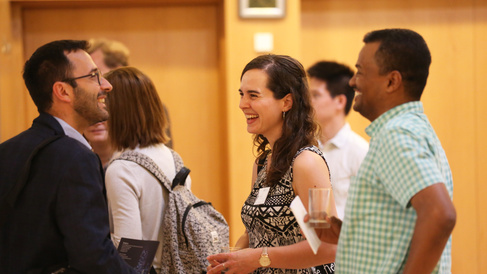
The Centre for Smart Infrastructure and Construction (CSIC) at the University of Cambridge is seeking to appoint an ‘Early-Career Academics and Professionals Panel’ (ECAPP).
The purposes of ECAPP are:
- To increase the diversity of views that are considered in CSIC’s strategic decision making.
- To strengthen connections between CSIC, its industry partners, and its broader academic network. In particular, to encourage the development of these connections between individuals at an increased range of seniorities.
- To provide a career development opportunity for early-career academics and professionals, through which they can meet like-minded individuals and work together to deliver a programme of activity, jointly agreed between the panel and CSIC.
The application window is now open for nomination of UK-based prospective panel members. If you are interested in nominating someone from your organisation, or would like to nominate yourself, please send the information listed in the Role Description below to CSIC (csic-admin@eng.cam.ac.uk) by 5pm on Friday 13th May 2022.
ECAPP opportunities
The panel provides opportunities for career development and networking, helping future industry and academic leaders in the fields of smart infrastructure and construction to build connections with like-minded peers and senior figures drawn from across the sector. Members of the panel, which will comprise approximately eight to 10 members drawn from across academia and industry, will be invited to publish thought leadership articles through ECAPP’s written output, which will find a significant readership among CSIC’s academic and industry networks and through its connections to industry publications. There will be mentorship and support throughout the tenure on ECAPP from senior figures among CSIC’s core leadership and Steering Group and the opportunity to participate in CSIC’s various annual events, such as its Industry Partner Strategy Day.
ECAPP members shall typically be at a relatively early stage of their careers – within approximately the first 10 years of graduation, or equivalent – and working in areas of relevance to CSIC. Individual circumstances, such as career breaks or changes, will be taken into consideration during the appointment process. In total, ECAPP’s activities and the attendance of meetings should not consume more than six to 10 working days annually.
Application Process
Candidates can be nominated by their organisation, or they may nominate themselves directly. In either case, the following information must be sent to CSIC (csic-admin@eng.cam.ac.uk) by 5pm on Friday 13th May 2022:
- Name, current role/organisation, and contact email address
- CV
- Brief (approx. 500 words) expressions of interest, outlining the candidate’s academic and/or professional experience to date, reasons for wishing to join ECAPP, and a summary of what they hope to gain from participation in ECAPP.
- Number of years of post-graduate (or equivalent) academic/professional experience to date, and details of any career change or break that should be considered while assessing candidates as ‘early career’ academics or professionals.
- If a candidate’s organisation cannot fund the time and expenses related to their ECAPP activities (up to an estimated annual limit of six to ten days) using internal funds, then a brief explanation of why this is the case must also be provided.
CSIC will use the expressions of interest to produce a shortlist of candidates and invite an initial cohort to join ECAPP for 2022 – 2023. CSIC may wish to interview candidates prior to appointment, particularly to discuss the selection of a chair and deputy chair for the panel and will contact candidates directly to confirm their appointment to ECAPP. CSIC may contact other shortlisted candidates and request permission to store their details and contact them at a later date regarding potential future cohorts of the panel.
Companies nominating ECAPP members are encouraged to fund their time and related expenses using their own internal budgets (e.g., for staff training or development). If this is not possible, applications should clearly state this; affected members will be able to apply for financial support from CSIC, towards these costs. For more details of ECAPP and the requirements of the role, please see the Terms of Reference below.
The first cohort of ECAPP will initially be in place for one year, from 1st June 2022 to 31st May 2023.
Tenure of Panel Members and Possibilities for Extension
Membership of ECAPP will initially be for a nominal period of 1 year, in the first instance, though this tenure and possibilities for extension will be kept under review by CSIC. If it becomes possible to extend ECAPP, panel members will be contacted to confirm who would be able to continue in post for a second year.
It is proposed that, if it becomes possible to extend ECAPP to future cohorts beyond 2022 – 2023, half of the membership of ECAPP will change annually. This will ensure continuity in ECAPP’s workplan and better handover of activities. In this scenario, ECAPP members would serve a term of two years in total, with the exception of any members of the initial cohort unable to continue in post for a second year.
• Read and download the Role Description here
• Read and download Terms of Reference here
